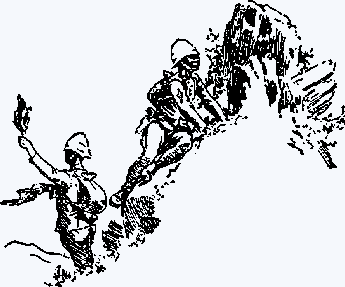Signals and Commands
Scouts have to be clever at passing news secretly from one place to another, or in signalling to each other.
Before the siege of Mafeking, which I told you about in my first yarn, I received a secret message from some unknown friend in the Transvaal, giving me news of the enemy's plans, the number of his men, horses, and guns. This news came in a very small letter rolled up in a little ball the size of a pill, then put inside a tiny hole in a rough walking stick, and plugged in there with wax. The stick was given to an African, who merely had orders to come into Mafeking and give me the stick as a present. Naturally, when he brought me the stick and said it was from a white man, I guessed there must be something special about it, and soon found the hidden letter.

I received a secret letter from another friend once. He had written it in the Hindustani language, but in English lettering. Anybody else studying it would have been quite puzzled about the language in which it was written, but to me it was clear as daylight.
When we sent letters out from Mafeking during the siege, we gave them to the Africans, who were able to creep out between the Boer outposts. Once through the line of sentries, the Boers mistook them for their own, and took no further notice of them. They carried the messages in this way: the letters were written on thin paper, and half a dozen or more were crumpled up tightly into a little ball, then rolled up into a piece of lead paper, such as tea is packed in. The scout would carry a number of these little balls in his hand, or hanging round his neck loosely on strings. If he saw he was in danger of being captured by an enemy, he would notice landmarks round about him and drop all the balls on the ground, where they looked like small stones. Then he would walk boldly on until accosted by the enemy, who, if he searched him, would find nothing.
The messenger would wait around for perhaps a day or two, until the coast was clear, then come back to the spot where the landmarks told him the letters were lying. "Landmarks", you may remember, mean any objects-trees, mounds, rocks, or other details-which act as sign-posts for a Scout who notices and remembers them.
Author
Lord Baden-Powell of Gilwell (Chief Scout, London, UK)
Date of Creation
1908
Learn A Continuation:
to the next page: Signalling
Back in The Past:
to the previous page: Sea Games
Мнение автора и других создателей данного материала
может не совпадать с официальной позицией администрации сайта.
При использовании материалов сайта обратная ссылка на GomelScouts.com обязательна.